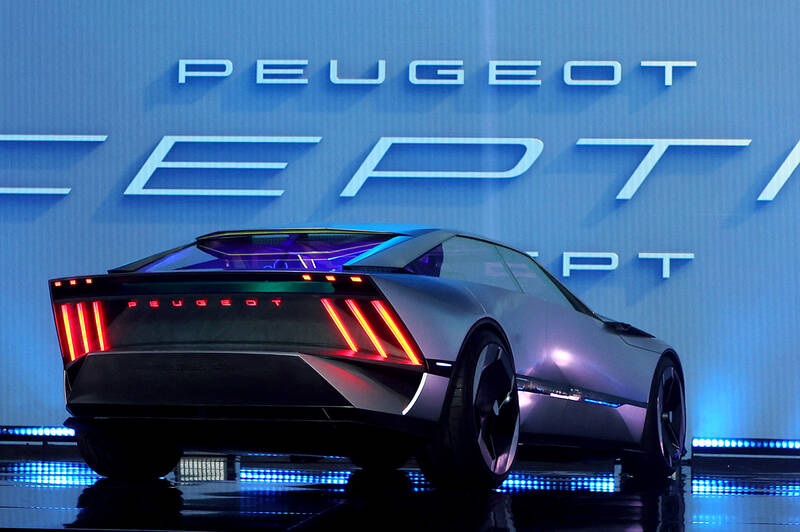Stellantis NV might idle additional auto manufacturing plants as it grapples with higher inflation on top of the cost of electrifying its lineup, chief executive officer Carlos Tavares said on Thursday.
“If we don’t optimize our cost structure, we cannot absorb the additional cost of electrification,” which risks leading to elevated prices and a shrinking market, Tavares told reporters in Las Vegas for the Consumer Electronics Show. “If the market shrinks, we don’t need so many plants. Some unpopular decisions will have to be made.”
The Netherlands-headquartered automaker last month said that it would idle a Jeep-making factory in Belvidere, Illinois, effective on Feb. 28, which would result in layoffs of an unspecified number of workers.

Photo: AFP
Still, should demand rebound, Stellantis might “adapt” its decision on that plant, Tavares said.
Automakers are already feeling the pinch of spiraling inflation, which is holding back some buyers even as semiconductor shortages that dogged the industry in the aftermath of the COVID-19 pandemic started easing.
In Europe, Volkswagen AG last month said that this year would likely be “even more challenging” than last year as demand is restricted amid high inflation and a worsening economic outlook.
An environment of higher interest rates, rising inflation and other economic headwinds has also begun to affect automakers outside of Europe.
Tesla Inc earlier this week reported a third straight deliveries miss despite offering hefty incentives in its biggest markets, while the CEO of Chinese electric automaker Nio Inc (蔚來汽車) has warned of a challenging first half.
Stellantis has no choice but to keep slashing its fixed, variable and distribution expenses to stay competitive and to make EVs more affordable for the middle classes, Tavares said, adding: “You go from hero to zero in three years if you stop working on costs.”
“It doesn’t always make us very popular, but it’s the right thing to do,” he said. “If you keep for a significant amount of time capacity that you don’t use, you put yourself in trouble. You need to continuously adapt your capacity to your needs.”
Tavares also is still considering whether to stop manufacturing vehicles altogether in China, the world’s biggest auto market.
Stellantis is continuing talks with its Chinese partner for Peugeot and Citroen vehicles because remaining in China “with an asset heavy presence would represent a major risk” should geopolitical tensions with the West escalate.
“The talks are difficult, they are respectful and they are not finished,” Tavares said.
Stellantis might implement an “asset-light” strategy for those brands in China, he said.
Earlier this year, Tavares used the same phrase to describe a decision to pull out from the company’s only Jeep plant in Asia’s largest economy.

TARIFFS: The global ‘panic atmosphere remains strong,’ and foreign investors have continued to sell their holdings since the start of the year, the Ministry of Finance said The government yesterday authorized the activation of its NT$500 billion (US$15.15 billion) National Stabilization Fund (NSF) to prop up the local stock market after two days of sharp falls in reaction to US President Donald Trump’s new import tariffs. The Ministry of Finance said in a statement after the market close that the steering committee of the fund had been given the go-ahead to intervene in the market to bolster Taiwanese shares in a time of crisis. The fund has been authorized to use its assets “to carry out market stabilization tasks as appropriate to maintain the stability of Taiwan’s

STEEP DECLINE: Yesterday’s drop was the third-steepest in its history, the steepest being Monday’s drop in the wake of the tariff announcement on Wednesday last week Taiwanese stocks continued their heavy sell-off yesterday, as concerns over US tariffs and unwinding of leveraged bets weighed on the market. The benchmark TAIEX plunged 1,068.19 points, or 5.79 percent, to 17,391.76, notching the biggest drop among Asian peers as it hit a 15-month low. The decline came even after the government on late Tuesday authorized the NT$500 billion (US$15.2 billion) National Stabilization Fund (國安基金) to step in to buoy the market amid investors’ worries over tariffs imposed by US President Donald Trump. Yesterday’s decline was the third-steepest in its history, trailing only the declines of 2,065.87 points on Monday and

TARIFF CONCERNS: The chipmaker cited global uncertainty from US tariffs and a weakening economic outlook, but said its Singapore expansion remains on track Vanguard International Semiconductor Corp (世界先進), a foundry service provider specializing in producing power management and display driver chips, yesterday withdrew its full-year revenue projection of moderate growth for this year, as escalating US tariff tensions raised uncertainty and concern about a potential economic recession. The Hsinchu-based chipmaker in February said revenues this year would grow mildly from last year based on improving supply chain inventory levels and market demand. At the time, it also anticipated gradual quarter revenue growth. However, the US’ sweeping tariff policy has upended the industry’s supply chains and weakened economic prospects for the world economy, it said. “Now

Six years ago, LVMH’s billionaire CEO Bernard Arnault and US President Donald Trump cut the blue ribbon on a factory in rural Texas that would make designer handbags for Louis Vuitton, one of the world’s best-known luxury brands. However, since the high-profile opening, the factory has faced a host of problems limiting production, 11 former Louis Vuitton employees said. The site has consistently ranked among the worst-performing for Louis Vuitton globally, “significantly” underperforming other facilities, said three former Louis Vuitton workers and a senior industry source, who cited internal rankings shared with staff. The plant’s problems — which have not